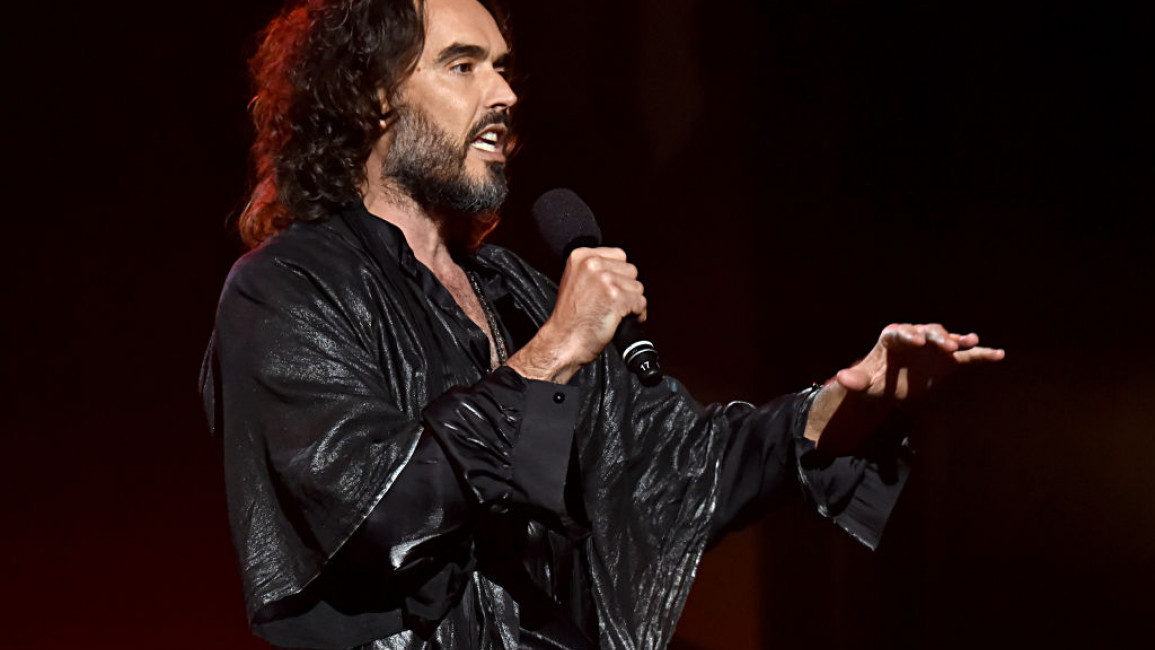Why are 'Syria, Ukraine conspiracy theorists' defending Russell Brand?
Following the publication of allegations of sexual assault against Russell Brand, a curious pattern has emerged: commentators on both the hard left and right of the political spectrum have rushed to the defence of the British comedian turned 'anti-establishment' figure. What do these figures have in common despite their diametrically opposed politics?
First, many of them seem to share a denial of Bashar al-Assad’s war crimes in Syria, Russian culpability in Ukraine, and other conspiracy theories surrounding COVID-19 and the vaccine. Many like to flash the US-led regime-change accusation whenever popular protests in countries with governments hostile to the West.
Many of them have framed the allegations against Brand as an attempt by the establishment or mainstream media to discredit him for his views - many of which have likewise been associated with conspiracies in recent years.
Comparing him to Julian Assange - known for releasing classified US military intelligence documents related to conflicts in Afghanistan and Iraq in 2010, and later accused of rape and sexual assault by two women - they allege that sexual misconduct is being used as a weapon to silence Brand and intimidate those who, like him, ‘challenge mainstream consensus’.
Some have denounced the outcry as “trial by media” and “mob justice”, calling Brand a “hero”, while one GB news show journalist reacted by tweeting that Brand was welcome on her show anytime.
Who’s defending Brand and what do they have in common?
Among Brand’s defenders are figures often associated with the Alt-Right - such as Elon Musk, Tucker Carlson, Andrew Tate, Jordan Peterson, Ben Shapiro, Alex Jones and several journalists from GB News, a right-wing British news channel. Alongside them are commentators linked to the left, such as Glenn Greenwald, George Galloway and Anya Parampil (who have segments on Russian Television International and Grayzone, respectively - both channels accused of being Russian-backed). Russell Brand has engaged extensively with both groups, including discussions with Tucker Carlson, Jordan Peterson, Alex Jones, Glenn Greenwald, and Grayzone journalist Aaron Maté.
Many of these figures have suggested that they (and their followers) are victims to powerful, malign forces working through the Western government and media establishment. According to them, the hostility of ‘the deep state’ is active at home and abroad - against anti-Western governments like Russia, Iran and Syria, against whom the state seeks to wage forever wars. These commentators are often accused of softening or denying the wrongdoing of such governments purely owing to their anti-Western orientation.
For example, Parampil reposted a tweet claiming there was ‘zero evidence’ Mahsa Amini - a Kurdish-Iranian woman killed while in Iranian police custody last year for improperly wearing her hijab - had been tortured by Iranian officials on the anniversary of her death. Galloway suggested Israel could have given chemical arms to al-Qaeda following the Assad regime’s infamous chemical weapons attack in Ghouta, Syria; the former MP also told Cambridge students at a speaker’s event that Uighur Muslims faced no discrimination in Xinjiang and the only Muslims incarcerated were “Al-Qaeda and ISIS fanatics”, despite a 2021 Amnesty Report to the contrary.
Meanwhile, right-wing figures such as Peterson, Carlson and Jones have intimated sympathy for Russia during its war against Ukraine, characterised as a proxy war provoked by a malignant West. At the same time, Maté has attempted to downplay President Assad’s culpability for chemical weapons attacks on Syrian civilians, notably in Ghouta and Douma. Brand has made a name for himself among such figures, collectively self-identifying as the ‘independent media’ or voices of truth.
"[The Islamic Republic] lost the battle of ideas because it's stopped offering any"https://t.co/NA6d9jvKub
— The New Arab (@The_NewArab) September 20, 2023
While skepticism is a healthy approach, many point out that a truly independent, truth-seeking approach would demand a full and thorough investigation of the serious allegations made against Mr. Brand, including rape, sexual assault and emotional abuse of four different women.
Remarkable how often the Syria test of who unconditionally backed Assad and enthusiastically denied his regime's use of chemical weapons in the early 2010s was already a strong indicator of a trajectory towards general crypto-fascist crankery. https://t.co/Nqgjvj7ZwK
— Alexander Clarkson (@APHClarkson) September 17, 2023
Why do smart people push conspiracy theories?
Conspiracy theories are not new, many have noted the unique alliance of which Brand’s defence seems to be composed.
Naomi Klein, author of the conspiracy-unravelling book “Doppelganger: A trip into the Mirror World”, noted that the post-Covid period was a time of “conspiracy cultures surging and strange left-right alliances emerging”.
The key to these alliances, she explains, is that it’s a “conspiracy culture, not conspiracy theories”, because it draws on “a feeling of being surveilled, a feeling of being left behind” rather than a specific coherent theory. By “throwing a lot of stuff at the wall [and] seeing what sticks”, conspiracists can broaden their appeal across the spectrum.
It’s not just about changing people’s beliefs, argues Lee McIntyre, author of several books on disinformation, science denialism and a post-truth era, but changing “the process by which they form future beliefs” until the conspiracist seems like “the only truth-teller out there”.
Unsurprisingly, all the worst people are defending Russell Brand. For posterity, here’s a few:
— Bob From Brockley 🥤 (@bobfrombrockley) September 16, 2023
[1/2] Lozza Fox, Ian Miles Cheong, Calvin Robinson, Bev Turner (GBNews)… pic.twitter.com/4Nf2qDiV3K
This status is used to evade accountability by discrediting critical media sources, against which both the left and right have been negatively polarised as their flanks are increasingly eaten up by conspiracism and contrarianism.
The range of figures defending Brand could be an example of the political pervasiveness of this conspiracism, and the lengths to which conspiracy theorists will go to preserve the worldviews affirming their personal prisms of identity and injustice - even amid overwhelming evidence to the contrary.
Dismissed as ‘pro-establishment propagandists’, those fighting for justice for themselves against abuse, or for their freedom in Iran, Syria, Xinjiang, Ukraine and elsewhere, stand to pay the price.



